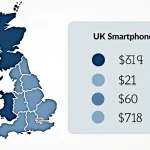Overview of Key UK Computing Trends in 2024
The UK computing trends in 2024 are marked by rapid advancements in artificial intelligence (AI), data analytics, and cloud computing. These technology trends UK reflect a strong push toward digital transformation UK, with businesses accelerating their adoption of AI-driven tools to optimize operations and improve decision-making. Cloud computing remains central to this growth, enabling scalable and flexible infrastructure that supports remote work and complex data analysis.
Privacy and data protection technology has emerged as a critical focus, driven by regulatory demands and consumer expectations. Enhanced encryption methods and privacy-focused software solutions address growing concerns over data breaches and misuse. This aligns with the broader digital transformation UK movement toward more secure and transparent data handling.
Topic to read : How can UK companies use gamification to boost customer interaction?
Automation and machine learning are increasingly embedded within UK companies to boost efficiency and reduce human error. From automated customer service to predictive maintenance in manufacturing, these trends demonstrate how technology trends UK are reshaping workplace productivity. UK businesses embracing these innovations position themselves competitively in an evolving digital economy.
Influence of Computing Trends on UK Marketing Strategies
The rise of marketing technology UK is transforming how businesses connect with consumers. One significant advancement is AI marketing, which enables enhanced personalisation by analysing vast datasets to tailor messages and offers precisely to individual preferences. This depth of insight allows marketers to create campaigns that resonate more deeply with target audiences, thereby improving engagement rates.
Topic to read : How is the UK marketing landscape evolving with the rise of voice search technology?
Automation in marketing plays a pivotal role in increasing campaign efficiency. Tasks such as email scheduling, social media posting, and lead nurturing can now be managed automatically, freeing up resources and reducing human error. This heightened efficiency often leads to an improved return on investment (ROI), as businesses can optimize their marketing efforts without increasing costs.
Data-driven targeting and segmentation are at the core of successful UK campaigns. By leveraging detailed customer information, marketers can segment their audience more effectively. This ensures that campaigns deliver relevant content to each segment, driving better conversion and customer loyalty. The combination of automation in marketing and AI-enabled personalisation forms a powerful toolbox for today’s UK marketers seeking competitive advantage.
Real-World Examples: UK Case Studies on Tech-Driven Marketing
Exploring UK digital marketing case studies reveals how businesses are embracing technology to drive innovation. In the retail sector, companies increasingly use predictive analytics and AI to tailor customer experiences. For example, AI-driven algorithms analyze shopping behaviors, enabling personalized promotions that boost engagement and sales.
Financial services in the UK also showcase marketing innovation UK by leveraging cloud computing solutions. These technologies offer secure, scalable platforms that enhance customer engagement without compromising data privacy. Cloud adoption allows banks and insurance firms to deliver real-time, personalized services efficiently.
Local SMEs are no exception in the wave of UK tech adoption. Many small businesses use automated marketing tools to streamline their digital outreach, saving time while expanding reach on social media and email campaigns. Automation empowers these businesses to compete effectively with larger players, optimizing both cost and performance.
These diverse applications underscore the transformative impact of technology across UK industries, highlighting how strategic adoption of AI, cloud, and automation drives measurable marketing success.
Actionable Insights for Marketers: Adapting to UK Computing Trends
In the evolving landscape of digital marketing strategy UK, integrating the latest computing technologies is crucial. Marketers must embrace tools like AI-driven analytics and automation to optimise campaigns and deliver personalised content. This adoption not only increases efficiency but also enhances customer engagement through data-informed decisions.
Building data literacy and digital skills within marketing teams is equally important. Teams proficient in interpreting complex datasets can better predict consumer behaviour and adjust strategies swiftly. Upskilling through targeted training ensures marketers stay competitive and fully leverage emerging technologies.
Finally, prioritising privacy and transparency in tech-driven campaigns is essential. With stricter UK regulations and rising consumer awareness, clear communication about data usage fosters trust and loyalty. Implementing consent-based data collection and transparent marketing practices aligns with best practices in protecting user privacy, ultimately sustaining long-term brand reputation.
By focusing on these pillars—tech integration, skill development, and privacy—marketers can robustly adapt to UK computing trends, ensuring their strategies remain effective and compliant. This approach epitomises marketing best practices UK for a rapidly changing digital environment.
Anticipating the Future: The Evolving Role of Computing in UK Marketing
With the future of marketing UK poised for rapid transformation, computing technology remains central to this evolution. Technology forecasts UK predict significant advancements in AI-driven analytics, real-time personalization, and enhanced customer journey mapping. These innovations will enable marketers to deliver hyper-targeted campaigns, maximizing engagement and ROI.
Marketers must embrace digital innovation UK with agility. This means continuously adapting to emerging tools and platforms, integrating data insights swiftly, and fostering a culture of experimentation. Staying ahead requires adopting flexible computing solutions that scale with business needs and consumer behaviour shifts.
Regulatory landscapes are also evolving. Marketers in the UK should prepare for stricter data privacy laws and transparency requirements. Proactively building compliance into computing strategies safeguards consumer trust and minimizes risks. Additionally, understanding shifting consumer expectations—such as demands for ethical data use and personalized experiences—will be key to maintaining relevance.
In summary, the future of marketing UK hinges on leveraging emerging computing technologies through continuous innovation and regulatory foresight. Those who anticipate changes and integrate advanced computing systems into their strategies will lead the UK’s dynamic marketing sector.







